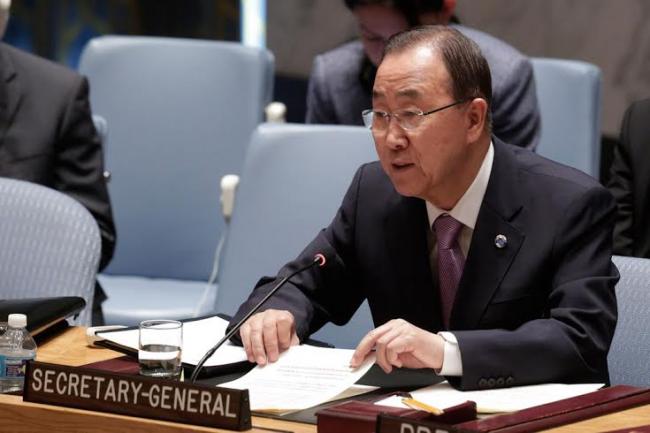30 Jul 2015, 06:47 am Print

“On March 28, I instructed my Special Envoy for Syria, Staffan de Mistura, to intensify efforts…to find a political settlement to the conflict,” reminded Ban, who specifically asked him to work to “operationalize the Geneva Communiqué.”
Laying out key steps in a process to end the violence, Geneva Communiqué, adopted in 2012 by the first international conference on the issue and later endorsed by the Security Council, calls, among others, for the establishment of a transitional governing body, with full executive powers and made up by members of the present Government and the opposition and other groups, as part of agreed principles and guidelines for a Syrian-led political transition.
After extensive consultations, de Mistura came up with what the Secretary-General called a “viable alternative,” which the Special Envoy presented himself this morning to the 15 Council members, a day after the UN Under-Secretary-General for Humanitarian Affairs, Stephen O’Brien, addressed the 15-member body, painting a grim picture of the situation on the ground in Syria.
“What I am today proposing is to deepen the Geneva consultations format. I now intend to invite Syrians to parallel thematic discussions through intra-Syrian working groups addressing the key aspects of the Geneva Communiqué,” safety and protection for all; political and constitutional Issues; military and security issues; public institutions; and reconstruction and development.
These working groups will start generating movement towards a “Syrian-owned framework document” on the implementation of the Geneva Communiqué, explained de Mistura, convinced that this effort should be led by a “Steering committee” composed of Syrians from these thematic groups and possibly elsewhere.
“The framework document will also provide for a transitional governing body, procedures for a national dialogue, the constitution drafting process and transitional justice issues,” continued the Special Envoy.
In that regard, he stressed, the support of the Security Council will be “critical” to convince all Syrian and regional players to get involved.
“Syria is the world’s largest humanitarian crisis,” stated the Secretary General. “At least a quarter-million Syrians have been killed.
Atrocious crimes are now almost an hourly occurrence, fed by a lack of accountability for the major human rights violations committed over the past four years and through decades of repression, he went on to say.
The Security Council unanimously endorsed the Geneva Communiqué, which remains the only internationally agreed basis for a political settlement to the Syrian conflict, he emphasized.
“[Mr. de Mistura]’s consultations made clear that the major stumbling block in the political process remains the issue of forming a Transitional Governing Body, with full executive powers that can create a suitable environment and safety for all during the transition,” the UN chief acknowledged.
The Secretary General said he stands ready to convene a “high-level international conference” to endorse any recommendations or agreement that the Syrian-led political process his Special Envoy intends to initiate may reach, including on the issue of the Transitional Governing Body.
Photo: UN Photo/Evan Schneider
- Viral Irish food bank photo sparks shocking racist attacks on Indians
- Caught on camera: Two foreigners assaulted in Israel in an alleged racial attack
- Pakistan: Parents heartbroken after court sides with man accused of kidnapping minor Christian girl
- Pakistan: Trafficked 35 years ago, Bangladesh-born woman approaches court against FIA for offloading her from flight!
- Hindu tea worker found bound and bloodied in Bangladesh garden during general elections; investigation underway





-1763561110.jpg)
